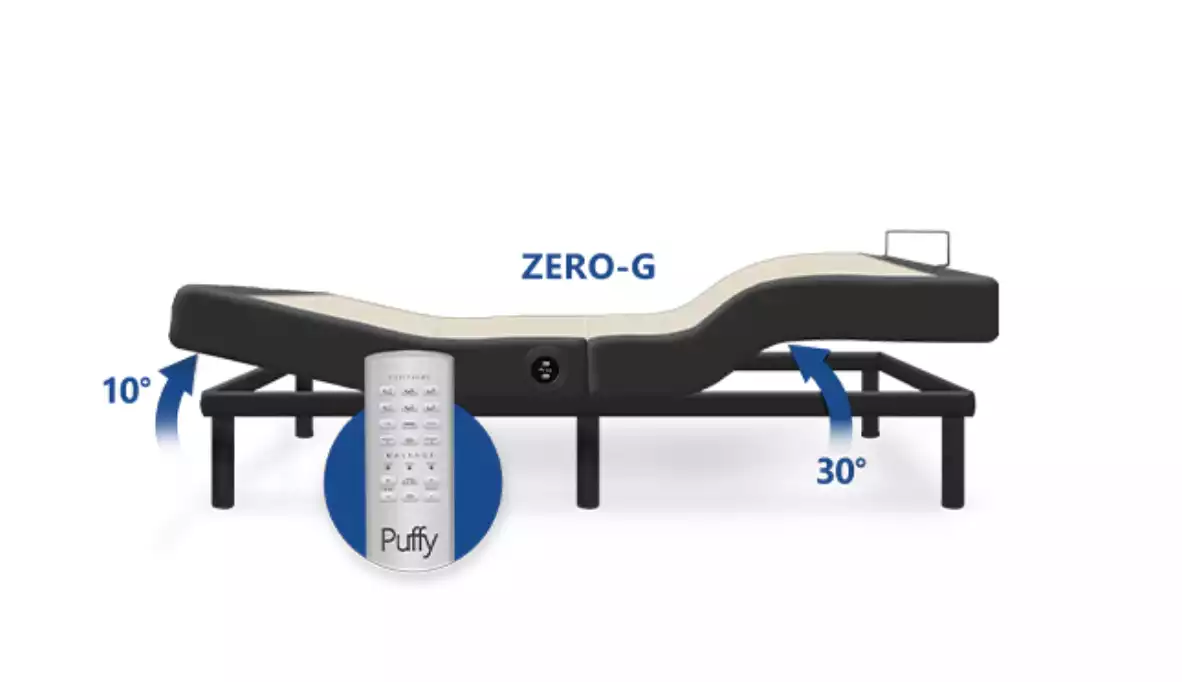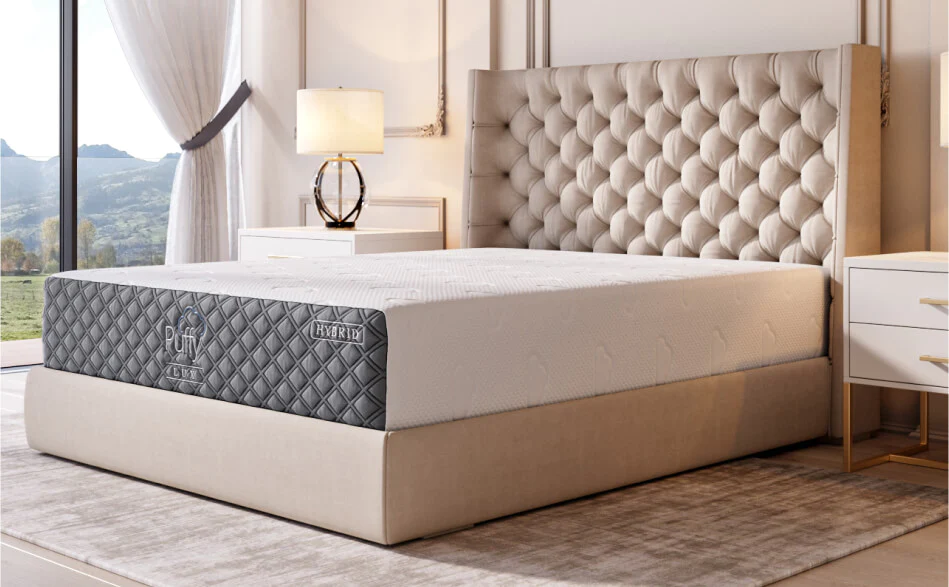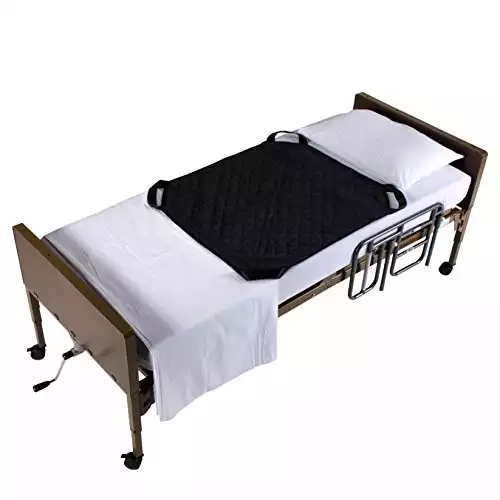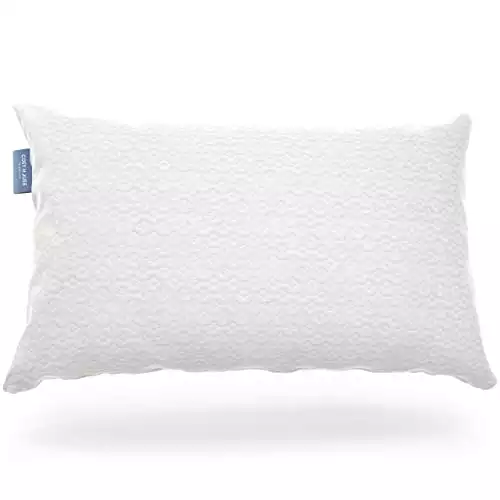7 Best Sleep Products for a Disabled Person: (Disability Sleeping Guide)
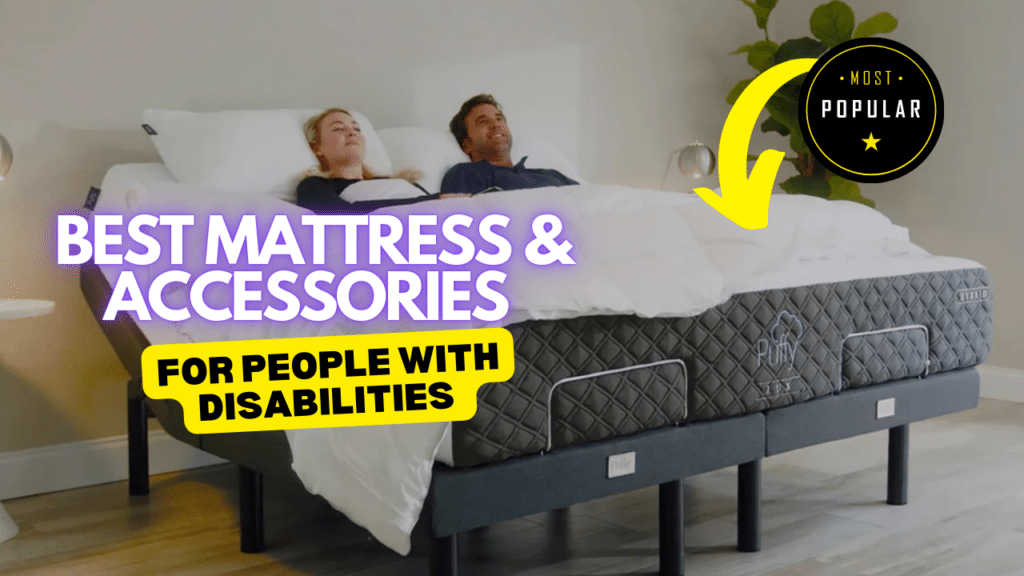
The optimal sleep setup for a disabled person often involves a combination of an adjustable bed with a pressure-relieving mattress, such as memory foam.
Accessories like mattress toppers for additional comfort, adjustable pillows for neck and head support, bed rails for safety, and potentially a bed wedge for elevation can further enhance sleep quality and safety.
Our 3 ESSENTIAL PRODUCT PICKS for a sleep set up for anyone with a disability :
1) Serenity Adjustable Bed – For Mobility, Pain, Comfort & Circulation
2) The Puffy LUX Hybrid Mattress – Luxury Pressure Relief for Pain
3) Guard Rail – For Getting in and out of bed and fall-proofing
Sleep is a fundamental aspect of overall health and well-being, and it’s particularly crucial for individuals with disabilities.
However, finding the right mattress and sleep accessories to meet unique needs can be challenging.
This guide aims to provide comprehensive information on the best types of mattresses and mattress accessories for individuals with disabilities, aiming to improve sleep quality, comfort, and safety.
7 SOLUTIONS:
7 Common sleep issues for people with disabilities & the best product to solve these issues
Problem #1: Difficulty with Mobility
Solution: Adjustable Bed
- Adjustable height options
- UBS ports
- LED lighting
- "Zero Gravity" position for back pain relief
- Vibrating massage feature
- Much More
An adjustable bed can significantly enhance the independence of individuals with mobility issues. These beds can be adjusted to different positions, making it easier for individuals to get in and out of bed. Some models even offer features like massage and zero-gravity positioning, which can increase comfort and ease pressure on the body.
Problem #2: Pressure Sores
Solution: Pressure Relief Mattress
Best Mattresses for Bed Sore Prevention
We tested hundreds and chose the best for pressure relief and pressure sore prevention
Pressure sores can develop from prolonged periods of lying in one position. A pressure relief mattress, often made from memory foam or latex, can help prevent this issue. These mattresses distribute weight evenly, reducing pressure points and promoting better circulation.
Problem #3: Pain relief & pressure relief:
Solution: Get a medium-firm pressure relieving mattress
- Unbeatable value
- Heavy duty support from wrapped coil system
- Luxury pressure relief
- Removable and washable cover
- Made in the USA
A pressure-relieving mattress can be an excellent choice for individuals with disabilities experiencing pain. These mattresses, often made from memory foam or coils, distribute body weight evenly across the surface, reducing pressure points that can cause discomfort or pain. This even distribution can prevent the formation of pressure sores, a common issue for those who spend extended periods in bed. Additionally, these mattresses conform to the body’s contours, providing personalized support that can aid in maintaining proper spinal alignment, further contributing to pain relief. Consequently, a pressure-relieving mattress can significantly improve sleep quality and overall comfort for people with disabilities dealing with pain.
Problem #4: Difficulty in Turning or Repositioning
Solution: Turning Aid
A turning aid can help individuals who have trouble turning or repositioning in bed. These aids come in various forms, including special sheets and devices, which can make turning easier and require less physical effort.
Problem #5: Risk of Falling Out of Bed
Solution: Bed Rails
See Our Favorite Bed Rails
We reviewed all of the most popular bed rails for safety and function
Bed rails provide a safety barrier that can prevent falls. They can also serve as support rails, helping individuals reposition themselves or get in and out of bed.
Problem #6: Need for Elevation
Solution: Bed Wedge Pillow
See Our Favorite Bed Wedges
We tested every major brand and picked our favorites
A bed wedge pillow can be used to elevate the upper body or legs. This can aid in circulation, reduce symptoms like acid reflux, and improve overall comfort.
Problem #7: Neck or Back Pain
Solution: Adjustable Pillow
An adjustable pillow can provide personalized support for the head and neck, reducing the risk of pain or discomfort. Some models can be customized in terms of height and firmness, allowing individuals to find their ideal comfort level.
Each individual’s needs will vary, so it’s essential to consider personal comfort and consult with healthcare professionals when choosing these products. Additionally, always ensure that the products meet safety standards and come with good warranties or return policies.
When choosing a mattress and bed setup, individuals with disabilities should consider the following…
- Support – The mattress should provide adequate support to maintain proper spinal alignment and distribute weight evenly.
- Pressure Relief – The mattress should conform to the body and alleviate pressure points to prevent discomfort and pressure sores.
- Ease of Movement – The mattress and bed setup should facilitate easy movement, especially for those with mobility issues.
- Adjustability – Adjustable beds can be beneficial for positioning, comfort, and assistance in getting in and out of bed.
- Safety – Consider the inclusion of bed rails or other safety features to prevent falls or injuries.
- Comfort – The mattress and bed setup should offer a comfortable sleep surface. This includes firmness level, surface feel, and temperature regulation.
- Height – The height of the bed should be appropriate for the individual’s needs, making it easier to get in and out of bed.
- Accessibility – Consider how easy it is to access the bed from a wheelchair, if necessary. Also consider the ease of reaching any controls for adjustable beds or other accessories.
- Durability – The mattress and bed setup should be durable and maintain their supportive and comfort qualities over time.
- Trial Periods and Warranties – Choose products from companies that offer sleep trials and good warranties. This allows you to test the products and ensures that they’re a good long-term investment.
- Consultation with Healthcare Professionals – Always consult with healthcare professionals when making these choices, as they can provide personalized advice based on the individual’s specific health needs and conditions.
Common Disability Sleeping Problems & Product to Fix it
People with disabilities may face various challenges when trying to sleep or get in and out of bed. Here are some common problems along with recommended products to alleviate these issues:
| Problem | Solution |
|---|---|
| Difficulty in Mobility | Adjustable Bed |
| Pressure Sores | Pressure Relief Mattress |
| Difficulty in Turning or Repositioning | Turning Aid |
| Risk of Falling Out of Bed | Bed Rails |
| Need for Elevation | Bed Wedge Pillow |
| Neck or Back Pain | Adjustable Pillow |
Choosing the Right Mattress
a. Adjustable Beds:
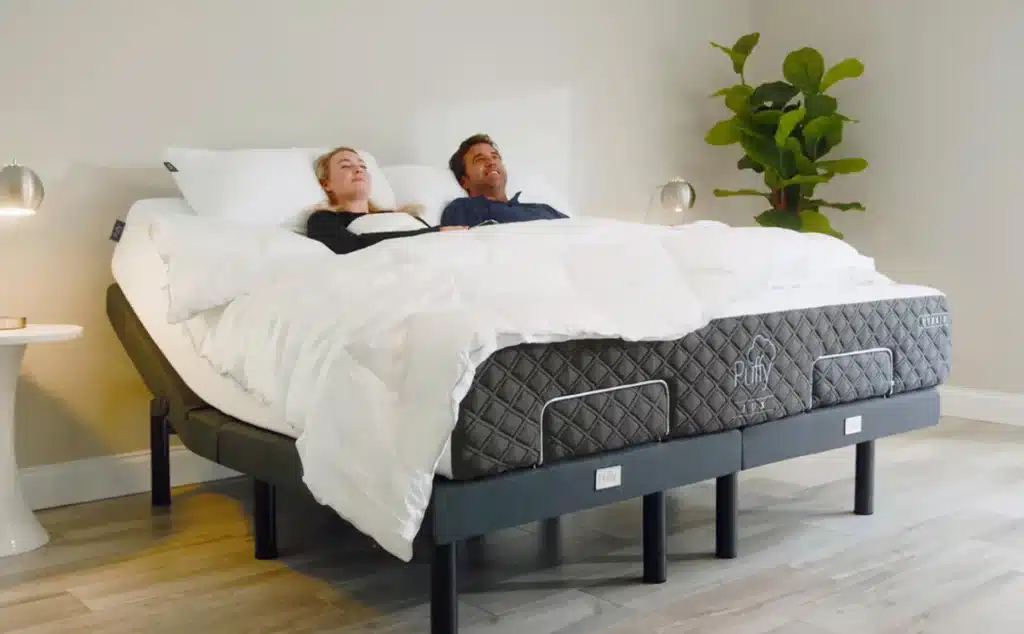
Adjustable beds allow for customization of the bed’s position, which can help alleviate pressure, provide tailored support, and assist with mobility. They’re often the first choice for individuals with disabilities as they offer features like elevating the head or feet, which can aid in circulation, reduce pain, and help with independent movement.
b. Memory Foam Mattresses:
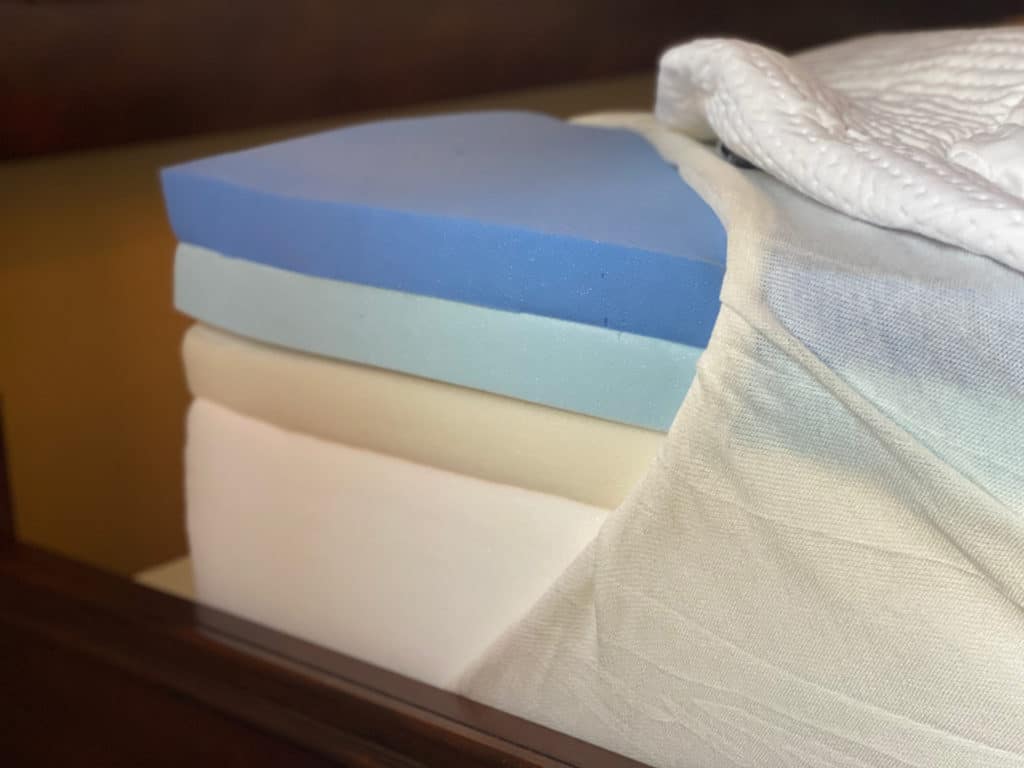
These mattresses are known for their pressure-relieving properties. They conform closely to the body, distributing weight evenly and reducing pressure points. This can be particularly beneficial for individuals with disabilities who may spend extended periods in bed.
c. Latex Mattresses:
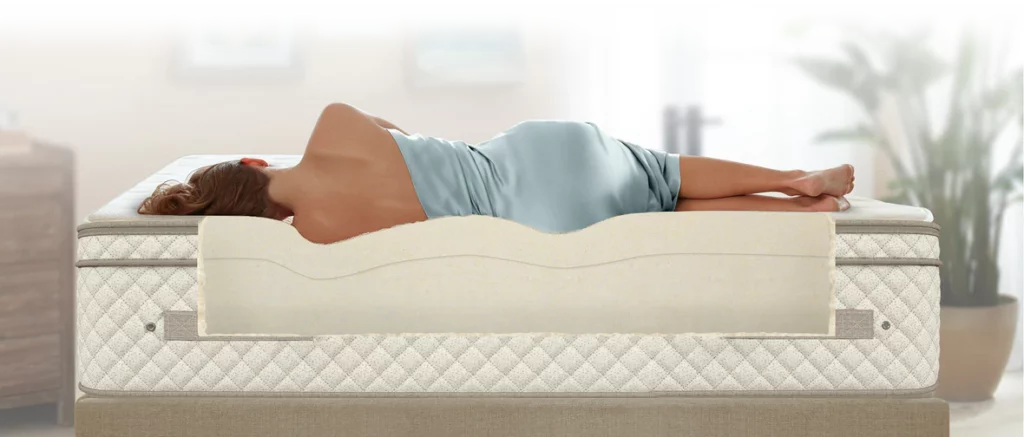
Latex mattresses offer a good balance of comfort and support. They’re also durable and resistant to sagging, making them a cost-effective choice in the long run.
d. Hybrid Mattresses:
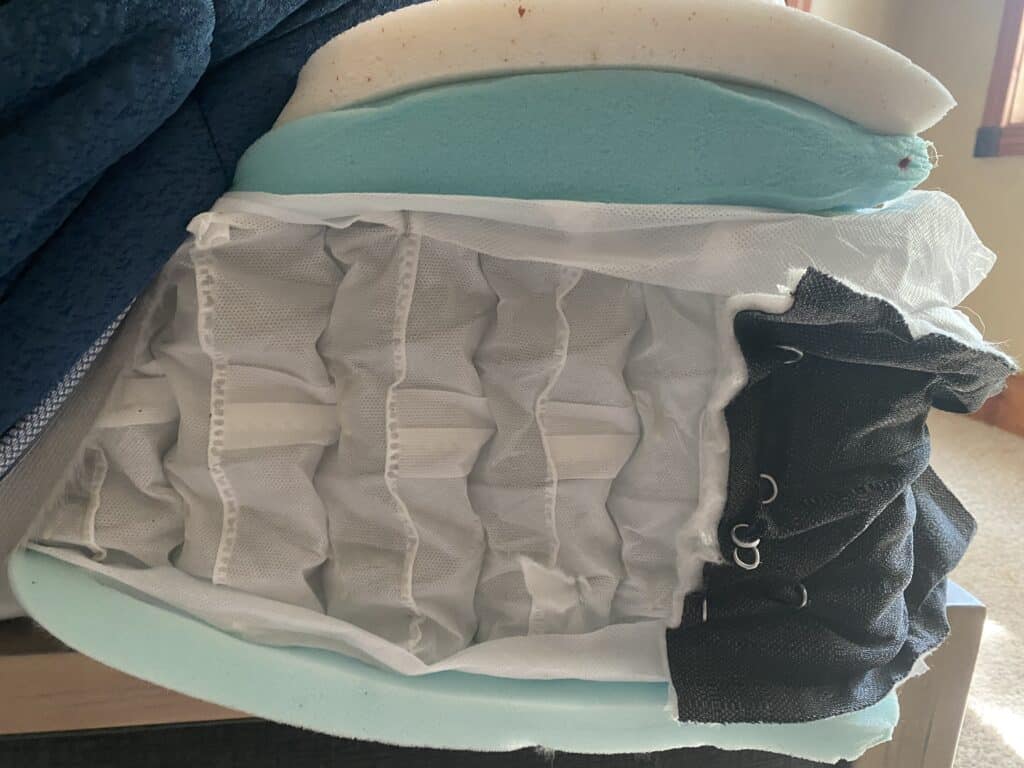
These mattresses combine the benefits of innerspring and foam/latex mattresses. They offer a balanced feel with good support, pressure relief, and temperature regulation.
Mattress Accessories for Enhanced Comfort and Safety
a. Mattress Toppers:
A mattress topper can provide additional comfort and pressure relief, especially for those who find their current mattress too firm. Memory foam or latex toppers are popular choices.
b. Adjustable Pillows:
These pillows can be customized to provide optimal support for the head and neck, reducing the risk of pain or discomfort.
c. Bed Rails:
Bed rails can enhance safety, especially for those with mobility issues. They provide support for getting in and out of bed and prevent falls.
d. Bed Wedges:
These can be used to elevate parts of the body, improving comfort and circulation, and reducing symptoms like acid reflux.
Additional Considerations
a. Firmness Level:
The ideal firmness level varies depending on personal comfort, sleep position, and specific disability. A medium-firm mattress is often a good starting point as it provides a balance of support and comfort.
b. Temperature Regulation:
Look for mattresses with good temperature regulation properties, especially for those prone to overheating.
c. Ease of Movement:
Some mattresses, like memory foam, can restrict movement, which might be a concern for those with mobility issues.
d. Trial Periods and Warranties:
Given the importance of individual comfort and support, consider companies that offer sleep trials and good warranties.
FAQs
What type of mattress is best for people with disabilities?
The best type of mattress will depend on the individual’s specific needs and preferences. However, memory foam and latex mattresses are often recommended because of their pressure-relieving properties. Adjustable beds are also beneficial as they provide flexibility in positioning.
What firmness level is suitable for people with disabilities?
This largely depends on the individual’s comfort preference and the type of disability. A medium-firm mattress is often a good starting point as it provides a balance of support and comfort. However, those with pressure sores or other specific needs might require a softer or firmer mattress.
How can bed rails help people with disabilities?
Bed rails can provide support for individuals with mobility issues, helping them to get in and out of bed more easily. They also act as a safety barrier, preventing falls during sleep.
How can a turning aid assist people with disabilities?
Turning aids can assist individuals who have difficulty repositioning themselves in bed. They can reduce the physical effort required to turn, enhancing comfort and reducing the risk of pressure sores.
What type of pillow is recommended for people with disabilities?
Adjustable pillows can be beneficial as they provide personalized support for the head and neck. They can be adjusted in terms of height and firmness, allowing individuals to achieve their ideal comfort level.
What is a bed wedge pillow and how can it help?
A bed wedge pillow is a triangular-shaped pillow that can be used to elevate the upper body or legs. This can aid in circulation, reduce symptoms like acid reflux, and improve overall comfort.
How often should a person with disabilities replace their mattress?
The lifespan of a mattress varies depending on its materials and construction. Generally, a mattress should be replaced every 7-10 years. However, if the individual notices increased discomfort, worsening of symptoms, or a decrease in the mattress’s support, it might be time for a replacement.
Are there trial periods or warranties for mattresses and sleep products?
Many mattress companies offer sleep trials, which allow customers to try the mattress for a certain period (usually around 100 nights) with the option to return it for a full refund if it’s not suitable. Warranties, which cover manufacturing defects, also typically come with mattresses and can range from 10 years to a lifetime. Similar policies might be available for certain sleep products as well. Always check with the retailer or manufacturer for specifics.
Conclusion
Choosing the right mattress and sleep accessories can greatly enhance sleep quality and safety for individuals with disabilities. By considering factors like support, pressure relief, temperature regulation, and ease of movement, it’s possible to create an optimal sleep setup. Remember, personal comfort and individual needs should always guide the decision-making process, and it’s beneficial to consult with healthcare professionals when making these choices.

